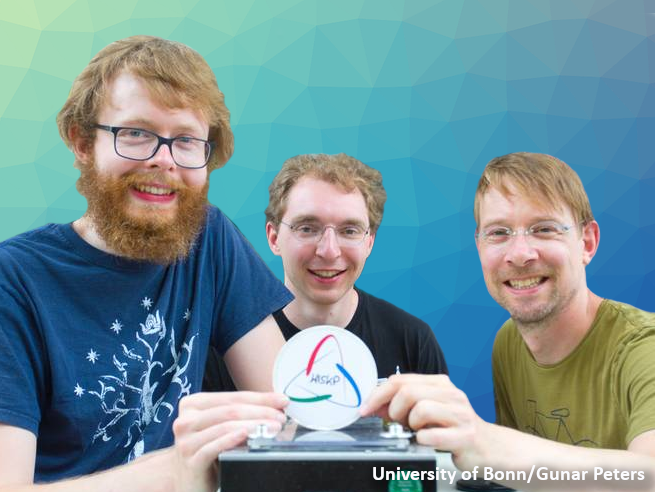Johann Ostmeyer (in the center), University of Liverpool, UK, Christoph Schürmann (on the left) and Carsten Urbach (on the right), University of Bonn, Germany, have received the inaugural Mario Markus Prize for Ludic Sciences for a joint publication in which they scientifically examined the flight behavior of beer mats.
With the award, the German Chemical Society (GDCh) honors scientific work in the field of natural sciences that is characterized by its playful character. The awardees receive the prize for their playful approach to a complex topic to gain exciting insights. The award ceremony took place on December 6, 2022, as part of a public event on the premises of the Physical Society in Frankfurt am Main, Germany. The award is presented by Mario Markus, Dortmund, who dedicated himself to ludic science and coined this term.
How Beer Mats Fly
During a joint visit to a brewery, Johann Ostmeyer, Christoph Schürmann, and Carsten Urbach, all of whom were at the University of Bonn at the time, asked themselves why beer mats, when thrown, do not fly straight like frisbees, but rather “tip” and fall down. Their scientific curiosity kicked in, and so the three researchers devoted themselves to the scientific investigation of the phenomenon.
It turned out that the reason for the special flight characteristics results from an interaction of gravity, lift, and conservation of angular momentum: Shortly after the throw, the beer mat tilts backward due to gravity. This gives it an angle of attack similar to that of a landing airplane. This angle creates lift in the airflow. “However, the buoyant force does not act in the middle of the beer mat, but in the front third,” explains Ostmeyer. This tips the beer mat. To obtain these results, the scientists built a beer mat throwing machine and recorded the flights with a high-speed camera. They published the results under the title “Beer Mats Make Bad Frisbees” [1].
There is no concrete application for this research. However, with their work, the awardees illustrate the entire process of scientific knowledge acquisition—from observation to theory and its experimental verification, as well as its adaptation and further development. They impressively show how a complex topic can be approached in a playful way and new insights can be gained in the process.
Reference
[1] J. Ostmeyer, C. Schürmann, C. Urbach, Beer Mats Make Bad Frisbees, Eur. Phys. J. Plus 2021. https://doi.org/10.1140/epjp/s13360-021-01732-1
Selected Publications by Johann Ostmeyer
- Mitigating the Hubbard sign problem with complex-valued neural networks,
M. Rodekamp, E. Berkowitz, C. Gäntgen, S. Krieg, T. Luu, J. Ostmeyer,
Phys. Rev. B 2022.
https://doi.org/10.1103/PhysRevB.106.125139 - Machine learning to alleviate Hubbard-model sign problems,
J.-L. Wynen, E. Berkowitz, S. Krieg, T. Luu, J. Ostmeyer,
Phys. Rev. B 2021.
https://doi.org/10.1103/PhysRevB.103.125153 - Semimetal–Mott insulator quantum phase transition of the Hubbard model on the honeycomb lattice,
J. Ostmeyer, E. Berkowitz, S. Krieg, T. A. Lähde, T. Luu, C. Urbach,
Phys. Rev. B 2020.
https://doi.org/10.1103/PhysRevB.102.245105
Selected Publications by Christoph Schürmann
- Detailed models of interacting short-period massive binary stars,
K. Sen, N. Langer, P. Marchant, A. Menon, S. E. de Mink, A. Schootemeijer, C. Schümann, L. Mahy, B. Hastings, K. Nathaniel, H. Sana, C. Wang, X. T. Xu,
Astron. Astrophys. 2022, 659, A98.
https://doi.org/10.1051/0004-6361/202142574 - Properties of OB star−black hole systems derived from detailed binary evolution models,
N. Langer, C. Schürmann, K. Stoll, P. Marchant, D. J. Lennon, L. Mahy, S. E. de Mink, M. Quast, W. Riedel, H. Sana, P. Schneider, A. Schootemeijer, C. Wang, L. A. Almeida, J. M. Bestenlehner, J. Bodensteiner, N. Castro, S. Clark, P. A. Crowther, P. Dufton, C. J. Evans, L. Fossati, G. Gräfener, L. Grassitelli, N. Grin, B. Hastings, A. Herrero, A. de Koter, A. Menon, L. Patrick, J. Puls, M. Renzo, A. A. C. Sander, F. R. N. Schneider, K. Sen, T. Shenar, S. Simón-Días, T. M. Tauris, F. Tramper, J. S. Vink, X.-T. Xu,
Astron. Astrophys. 2020, 638, A39.
https://doi.org/10.1051/0004-6361/201937375 - X-ray emission from BH+O star binaries expected to descend from the observed galactic WR+O binaries,
K. Sen, X.-T. Xu, N. Langer, I. El Mellah, C. Schürmann, M. Quast,
Astron. Astrophys. 2021, 652, A138.
https://doi.org/10.1051/0004-6361/202141214
Selected Publications by Carsten Urbach
- Unusually warm winter seasons may compromise the performance of current phenology models – Predicting bloom dates in young apple trees with PhenoFlex,
E. Fernandez, K. Schiffers, C. Urbach, E. Luedeling,
Agric. For. Meteorol. 2022, 322, 109020.
https://doi.org/10.1016/j.agrformet.2022.109020 - Computing K and D meson masses with twisted mass lattice QCD,
R. Baron, P. Boucaud, J. Carbonell, V. Drach, F. Farchioni, G. Herdoiza, K. Jansen, C. Michael, I. Montvay, E. Pallante, O. Pène, S. Reker, C. Urbach, M. Wagner, U. Wenger,
Comput. Phys. Commun. 2011, 182, 299–316.
https://doi.org/10.1016/j.cpc.2010.10.004 - tmLQCD: A program suite to simulate Wilson twisted mass lattice QCD,
K. Jansen, C. Urbach,
Comput. Phys. Commun. 2009, 180, 2717–2738.
https://doi.org/10.1016/j.cpc.2009.05.016
Also of Interest
- TwitterVideo of flying beer mats (accessed December 7, 2022)
-
Interview: Poetry and Chemistry,
Vera Köster,
ChemistryViews 2013.
https://doi.org/10.1002/chemv.201300010
Professor Mario Markus, scientist, artist, author, and poet, talks about what science can offer to art and how art can benefit science




